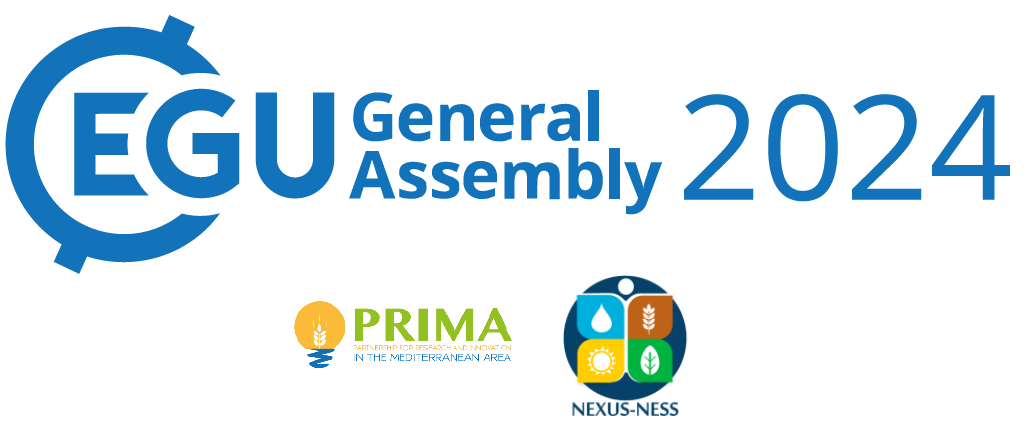
During the European Geosciences Union (EGU) General Assembly 2024, the partners of the European NEXUS-NESS project had the opportunity to present their work to a large audience of geoscientists from around the world. The event, known to cover a wide range of Earth-related scientific disciplines, provided an ideal platform to share the challenges and opportunities of WEFE Nexus (Water, Energy, Food, Ecosystem).
At the General Assembly of the European Geosciences Union (EGU) 2024, several topics related to the NEXUS-NESS project and the Water-Energy-Food-Ecosystem (WEFE) Nexus were presented. Here is an overview of the presentations with their respective topics:
PRIMA NEXUS-NESS: Operationalizing transdisciplinary, stakeholder engagement and biophysical models for co-demonstrating the multiple social, economic and environmental benefits of WEFE Nexus approaches in four Euromed Nexus Ecosystem Labs.
This presentation, led by Fernando Nardi and the NEXUS-NESS consortium, illustrated the importance of a transdisciplinary approach and stakeholder engagement in Nexus Ecosystem Labs.
read all articles
Water-Energy-Food-Ecosystem Nexus Transition through the Responsible Research and Innovation Roadmap – Lessons learned from four Mediterranean countries.
Xenia Schneider and colleagues illustrated how the Responsible Research and Innovation (RRI) concept can facilitate the transition of the WEFE Nexus through the RRI Roadmap, highlighting lessons learnt in four Mediterranean countries.
read all articles
Modelling the Water-Energy-Food NEXUS in the Val di Cornia UNESCO Ecohydrological Observatory. A FREEWAT-Q3 implementation.
Rudy Rossetto discussed the implementation of the WEFE Nexus model in the Val di Cornia UNESCO Ecohydrological Observatory, using the FREEWAT platform.
read all articles
Inform to involve: women’s contribution to Water-Energy-Food-Ecosystems (WEFE) Nexus transition in Egypt.
Bianca Maria Rizzo and colleagues explored the role of women in the WEFE Nexus transition in Egypt, emphasizing their contribution and the need for greater inclusiveness.
read all articles
Participatory development of indicators to support WEFE Nexus management in the Mediterranean.
Tommaso Pacetti et al. presented the participatory development of indicators for the management of the WEFE Nexus in the Mediterranean, highlighting the importance of actively involving stakeholders.
read all articles
Unravelling the role of groundwater in the Water-Energy-Food NEXUS.
Xinyuan Yue and his team analyzed the role of groundwater in the WEFE Nexus, emphasizing the need to better understand this critical resource.
read all articles
First steps into Water-Energy-Food-Ecosystem Nexus Transition in semiarid depopulated regions: A case of study in the Spanish Duero basin.
Daniel Alberto Segovia-Cardozo et al. examined the first steps of the WEFE Nexus transition in semi-arid and depopulated regions, focusing on the Spanish Duero Basin.
read all articles
These themes represent a comprehensive view of the challenges and opportunities related to WEFE Nexus, showing how the NEXUS-NESS project is working to develop innovative and sustainable solutions.






The presentation of the NEXUS-NESS project followed the following lineup:
WEFE Nexus challenges
During the General Assembly of the European Geosciences Union (EGU) 2024, partners of the European NEXUS-NESS project presented their work to geoscientists from around the world, highlighting the challenges and opportunities of the WEFE Nexus (Water, Energy, Food, Ecosystem) in the Mediterranean. Key challenges include water scarcity, prolonged droughts, extreme flooding, and rising energy prices, all of which affect food production and water resource management.
To address these challenges, NEXUS-NESS partners are developing sustainable solutions that recognize and manage the connections between water, energy, food, and ecosystems, working to improve resource management in the Mediterranean and beyond.
Why do we need change and transition management?
During the EGU 2024 General Assembly, NEXUS-NESS project partners reiterated the importance of managing change and transition to more sustainable models, especially in the context of the WEFE Nexus (water, energy, food, and ecosystems). A holistic approach is crucial to avoid fragmented solutions that do not consider the interdependencies among these elements.
The RRI Roadmap©TM methodology (XPRO)
the RRI Roadmap©TM methodology, an approach that promotes accountability in research and innovation, was explained. Research and Innovation (RRI) represents a model that encourages inclusive participation and transparency in the research process, ensuring that innovation considers ethical, social, and environmental issues.
Application in the Mediterranean Basin
Partners showed how the RRI methodology has been applied in the Mediterranean basin, offering concrete examples of project activities.
Conclusion
Participation in EGU 2024 was a valuable opportunity for NEXUS-NESS project partners to connect with the global scientific community, share their experiences, and gain valuable feedback to further improve the project. With an ongoing commitment to sustainability, the NEXUS-NESS team is excited to tackle future challenges and collaborate with experts from around the world.
Among the key conclusions were that the Responsible Research and Innovation (RRI) approach is a valuable tool to address the challenges of the WEFE Nexus with a holistic perspective. The RRI Roadmap©TM methodology, presented during the assembly, provides step-by-step tools and guidelines for actively engaging stakeholders in the co-creation process, enabling their consensus and support.
